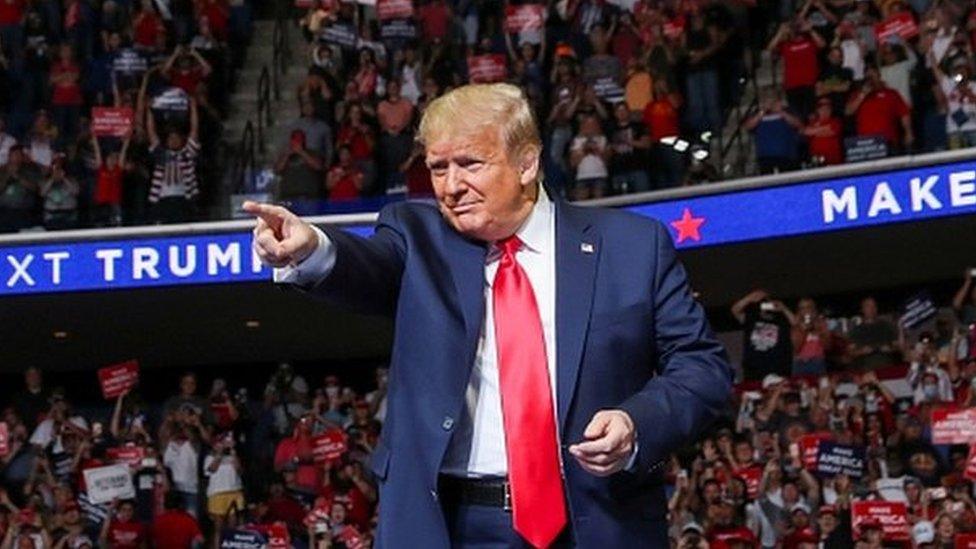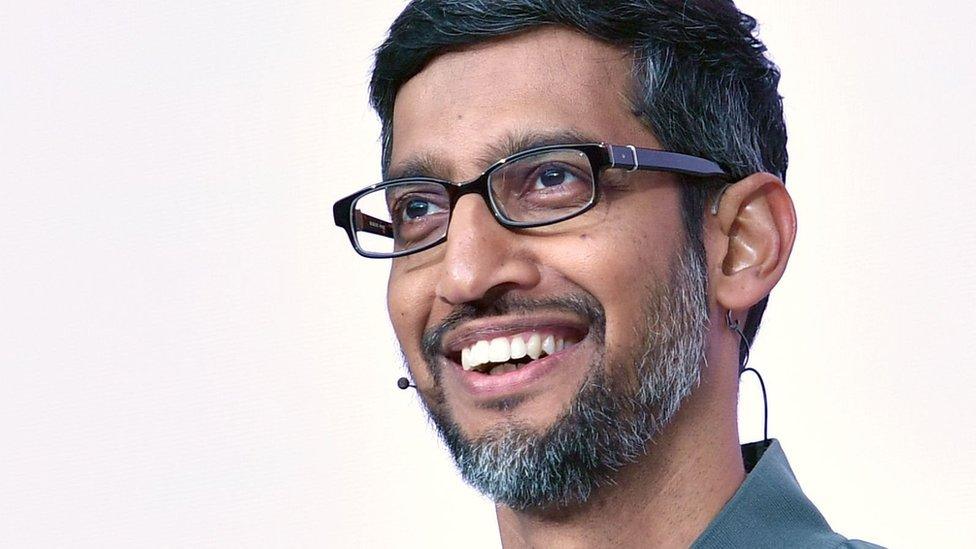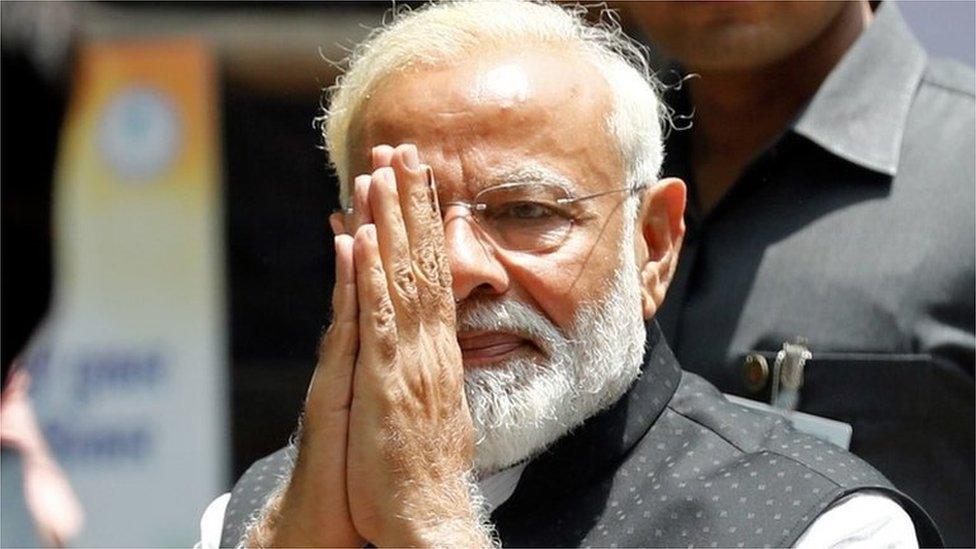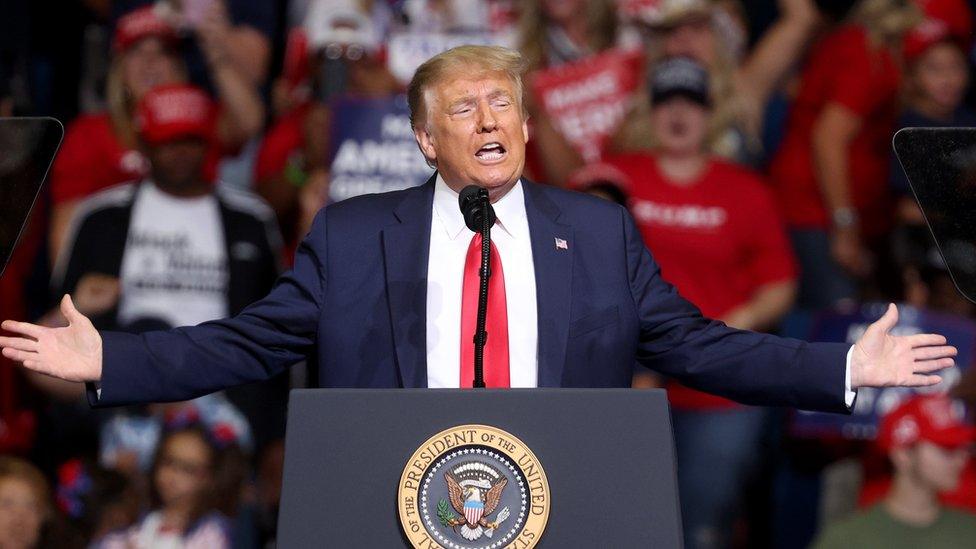H-1B visa: New US law is bad news for Indian tech workers
- Published

US President Donald Trump has suspended visas for highly-skilled workers until the end of this year.
The White House said the move would create jobs for Americans hurting economically due to the pandemic.
But critics say the White House is exploiting the coronavirus pandemic to tighten up immigration laws.
The H-1B visa is among several categories of visas that have been suspended and it is expected to particularly hurt Indian technology companies and workers.
Reports say that Indians take up nearly 70% of the 85,000 H-1B visas issued every year.
What is the H-1B visa?
It is a non-immigrant visa that allows firms to employ foreigners for up to six years in positions for which they have been unable to find American employees.
It also allows holders to apply for permanent residency in the US and buy property in the country.
The visa is useful for Indian tech giants like Wipro, Infosys and Tata Consultancy Services (TCS) as it allows them to send workers from India to manage important projects.
It also helps US tech giants like Google, Facebook and Twitter hire talent from India.
The ban announced by Mr Trump will only affect individuals who are planning to apply for the visa - which means those who have already got it and are working in the US will not be affected.
However, H-1B visa holders who travelled to their home countries due to the pandemic will not be allowed to re-enter the US until the end of the year.
What has the reaction been?
Most tech firms have criticised the move, saying it will hurt the US economy instead of saving it.
Google boss Sundar Pichai, who was born in India, said he was disappointed with the order.
"Immigration has contributed immensely to America's economic success, making it a global leader in tech, and also Google the company it is today. Disappointed by today's proclamation - we'll continue to stand with immigrants and work to expand opportunity for all," he tweeted.

Sundar Pichai is the new chief executive of Google
Jason Oxman, president and CEO of the Information Technology Industry Council in the US, said the decision "stands to upend the ability of US employers to hire the men and women they need to strengthen their workforce".
"We urge President Trump to reconsider his actions and work with the business community on a plan that will actually bolster job growth and ensure economic security for all Americans," he added.
The move has also been criticised in India.
The Indian IT industry's apex body Nasscom has said the decision was "misguided and harmful to the US economy."
"We urge the administration to shorten the duration of these restrictions to 90 days. Lengthening these burdensome restrictions on US companies that are trying to recover from the economic fallout of the Covid-19 pandemic will only serve to harm our economy."
The move has already had an adverse impact on the stock prices of Indian IT firms. Share prices of big IT firms like TCS, Wipro, Tech Mahindra and Infosys have seen sharp falls.
What has India said?
Nothing yet.
The Indian government is yet to react to the decision. It is likely to wait and watch at the moment as authorities are struggling with a worsening pandemic as well as border tensions with China.
Delhi cannot afford a new rift with Washington. However, it may opt for backchannel talks to secure some relief for Indian workers.
Indian Prime Minister Narendra Modi is heavily invested in India-US ties and often talks about his personal friendship with Mr Trump.
But given the unpredictability of the Trump administration, there are no guarantees that even this will yield results.

Indian PM Narendra Modi ays Mr Trump is his close friend
In such a scenario, India may choose to take retaliatory action.
Major portions of India's technology markets are dominated by American firms such as Google, Dell, Hewlett-Packard, Microsoft and Apple, as well as consulting and services firms such as IBM and Accenture.
Delhi can look at blocking visas for US employees of these firms, but such a decision will depend the government's willingness to take the risk of antagonising the Trump administration.
What other visas has the US suspended?
The order also applies H-2B visas for seasonal workers, including those in the hospitality industry, except those in agriculture, the food processing industry and healthcare professionals.
The order will restrict J-1 short-term exchange visas, a category that includes university students and foreign au pairs who provide childcare. Professors and scholars are not included in the order. There will be a provision to request exemptions.
L visas for managers and other key employees of multinational corporations will also be suspended.
- Published23 June 2020
